Express VPN and Private Internet Access VPN (PIA) were released around the same time (ExpressVPN in 2009 and PIA in 2010) and have become two of the most popular VPNs in the course of the past decade. However, in recent years ExpressVPN has become one of the most widely regarded VPNs, which has left many people wondering, is PIA still a reliable service?
Both providers have a lot to offer in terms of security and features, so what is the reason for ExpressVPN’s immense popularity? If you’re having trouble deciding between these two VPNs, don’t worry. Below is a comparison of the two providers that compares everything from the level of security they each offer to extra VPN services up for grabs within a subscription.
ExpressVPN and PIA both frequently top ‘best VPN’ lists, and we’re big fans of both providers at VPNSurfers. However, these two providers are rather different and excel in very different areas. Read on to find out which VPN might be best for you.
A VPN shrouds your web traffic in a layer of encryption, hiding it from interested third parties and giving you more privacy. However, some VPNs offer better encryption levels, like AES-256 bit encryption, and use more secure protocols to ensure that users’ privacy and online security are never put at risk.
So, is ExpressVPN really private? ExpressVPN uses advanced AES-256 bit encryption with Perfect Forward Secrecy for new encryption keys at each session. Express uses an assortment of protocols, including OpenVPN, L2TP/IPSec, PPTP, and IKEv2, as well as its new Lightway protocol. The Lightway protocol is based upon the WireGuard protocol but eliminates some of the safety issues of WireGuard.
PIA offers a few encryption standards to hide VPN traffic in a secure VPN tunnel. The default encryption level is AES-128, which is decent, but we recommend users adjust this to AES-256 in the app. PIA VPN also has a range of protocols on offer, but its default option is OpenVPN, which you can choose to run over UDP or TCP.
Other tunneling protocols are available with PIA, like PPTP, L2TP/IPSec, and WireGuard, and PIA offers a range of handshaking method options. You can customize your encryption level entirely with PIA, depending on whether you prefer fast speeds and less secure connection or want solid encryption to protect internet traffic.
Any VPN worth its two cents should not keep logs of user browsing activity or anything else related to the VPN use. Is Express VPN trustworthy? The answer is yes. ExpressVPN has a strict no-logging policy and states in its privacy policy that it only collects dates you used the VPN, data used during sessions, and the server you connected to. No identifiable user logs are stored or shared.
Luckily, none of the above information is enough to link any activity to you on the network. Like most VPN providers, ExpressVPN also stores account details like name, email, and billing information.
ExpressVPN has had its privacy policy audited by an independent third party which verifies its zero-logging claims. When an ExpressVPN server was seized in 2017 in Turkey, no data was found, which is a reassuring sign.
Private Internet Access also operates a no-logs policy, only storing some customer data like name, email address, and billing details. The no-logging claim has been verified not once but twice. In 2015 and 2017, the company had its hand forced and handed over data from its servers to the US government. However, nothing was incriminating on the servers since PIA doesn’t store web traffic data or browsing history.
For complete clarity, PIA VPN publishes an annual transparency report. This reveals how many network breaches there have been and how many times government authorities have requested data from the provider’s servers.
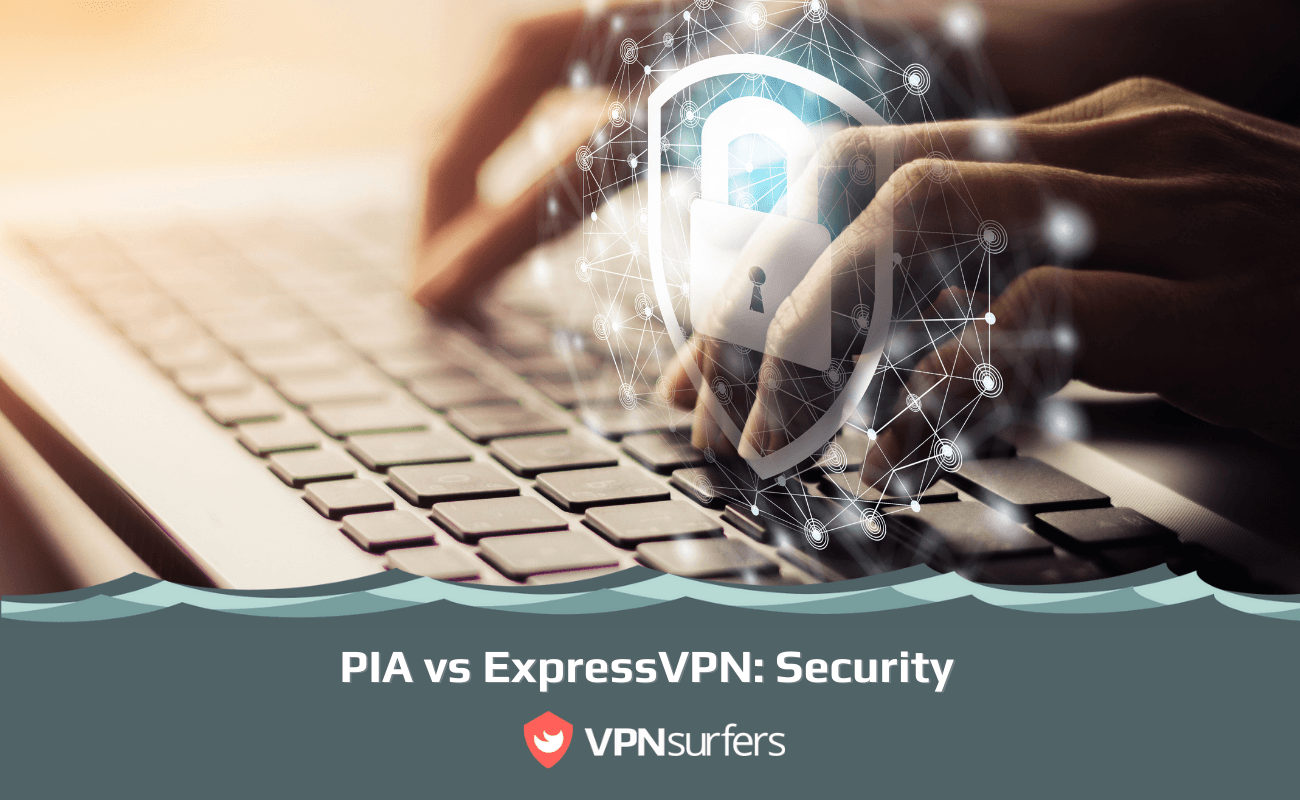
Why does a VPN jurisdiction matter? Each country has its own data retention laws, which affect how much information Internet Service Providers (ISPs) and websites collect on you.
ExpressVPN is located in one of the best places in terms of data laws; it is based in the British Virgin Islands. This is great news for customers since the great privacy laws in the British Virgin Islands are excellent, and ExpressVPN users can benefit from these.
Private Internet Access, on the other hand, is based in the United States. This is quite worrying since the United States has no data protection laws to protect users’ privacy online. On top of this, the US is a member of the Five Eyes. The Five Eyes is an international surveillance alliance between many member states and considered the world’s biggest espionage mission.
Fortunately, as illustrated in the no-logs section, the location of PIA’s headquarters doesn’t affect the safety of user data. Since the provider doesn’t store any logs on user browsing activity in the first place, it has nothing to show when forced to produce data from its servers.
DNS queries can reveal your IP address and other information about your online activity. Fortunately, Private Internet Access and ExpressVPN have their own DNS. We tested both providers to affirm whether this was true or not, and we can confirm that both providers are fully DNS leakproof.
Another plus is that ExpressVPN and PIA both offer IPv6 leak protection to stop your IPv6 traffic from leaking.
ExpressVPN employs TrustedServer technology to ensure that users get the most secure experience online. ExpressVPN uses volatile RAM-only servers, which wipes itself every time the servers are switched off. PIA has also switched to RAM servers since they offer more security than hard-drive servers.
As well as this, each provider offers an automatic kill switch. ExpressVPN has the Network Lock, which is its version of the kill switch and is automatically activated upon downloading the VPN app. PIA also provides an internet kill switch that ceases internet access whenever the VPN connection cuts out.
Finally, PIA has MACE, a malware, adware, and tracker blocker. While PIA MACE isn’t available on iOS devices, we don’t see that as much of an issue since iOS devices usually have good security pre-installed. ExpressVPN has also introduced a verification system to reduce users’ risk of encountering malware via the ExpressVPN apps.
The winner: It’s a close call between PIA and ExpressVPN. Both providers make a big effort to ensure their users’ security and privacy and offer multiple security features. ExpressVPN impresses us due to its audited privacy policy, but we really like PIA’s MACE feature. ExpressVPN is also based in the British Virgin Islands, a better location than the United States. However, we’d recommend either VPN in terms of security and privacy.
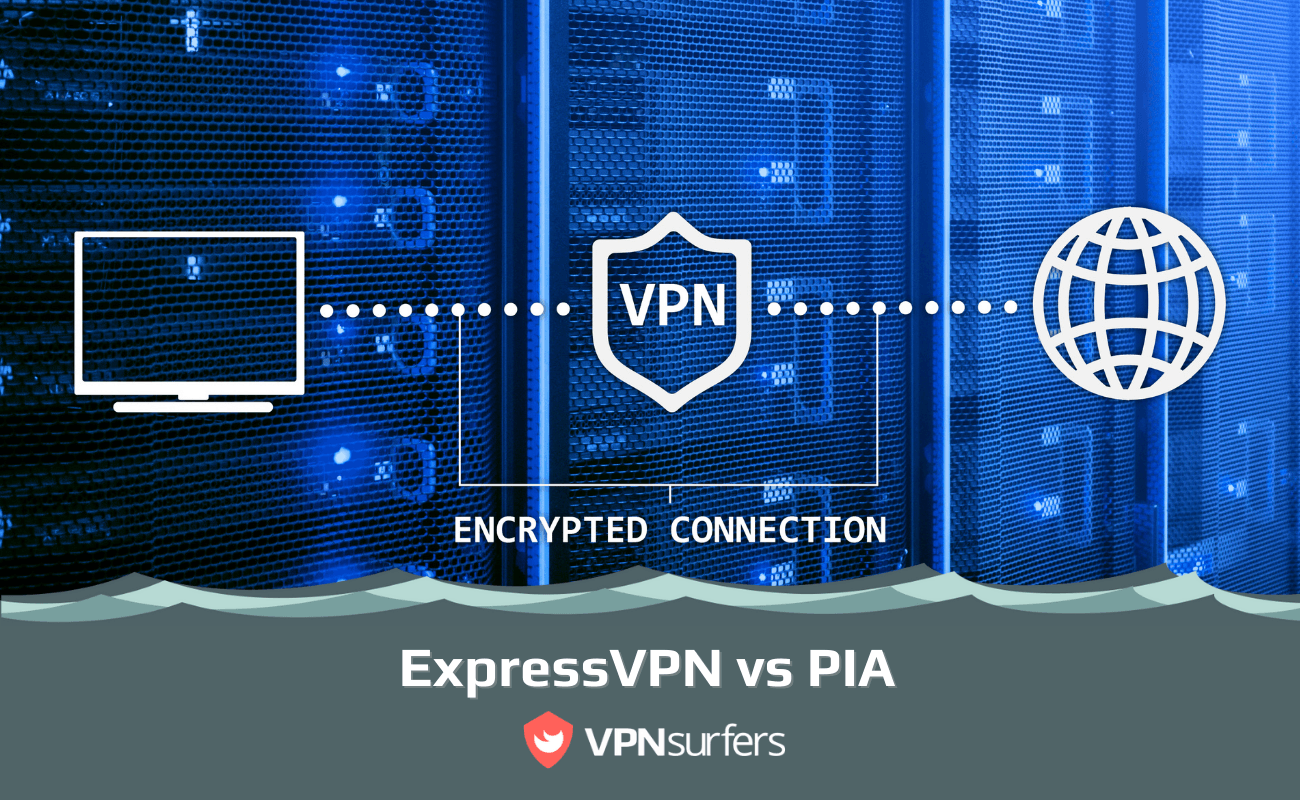
The number of servers and server location options are significant for a few reasons. Multiple servers in varied locations equal more possibilities to access restricted content online. Also, more servers usually indicate lower server loads and faster overall speeds.
ExpressVPN has a decent-sized network of 3000 servers around the world. However, this pales in comparison to PIA’s mammoth-sized server network that consists of over 29,288 servers. This is incredibly impressive and one of the largest server networks offered by any VPN company.
Both providers use virtual and physical servers, which explains why PIA can have such a large server network.
Oftentimes, VPNs can have a large number of servers but not have a broad range of locations. PIA has VPN server locations in 99 countries across 77 countries, while ExpressVPN has 160 server locations in 94 countries.
So, even though PIA has more servers, ExpressVPN actually has a more far-reaching server network. Among the 94 countries that ExpressVPN operates in include the USA, Costa Rica, Venezuela, and many other American countries. There are also many servers in Asia and Europe, but ExpressVPN lacks locations in Africa and the Middle East.
In contrast, PIA’s servers are mostly based in Europe and the Americas. However, PIA has some optimal server locations, including China, which is great news for Chinese residents or visitors to the country.
The winner: While PIA has more physical and proxy (virtual) servers, ExpressVPN offers more server locations across 94 countries which may be better for some users. Depending on whether network size or location options are more important to you, one of these VPNs will be better than the other in that sense.
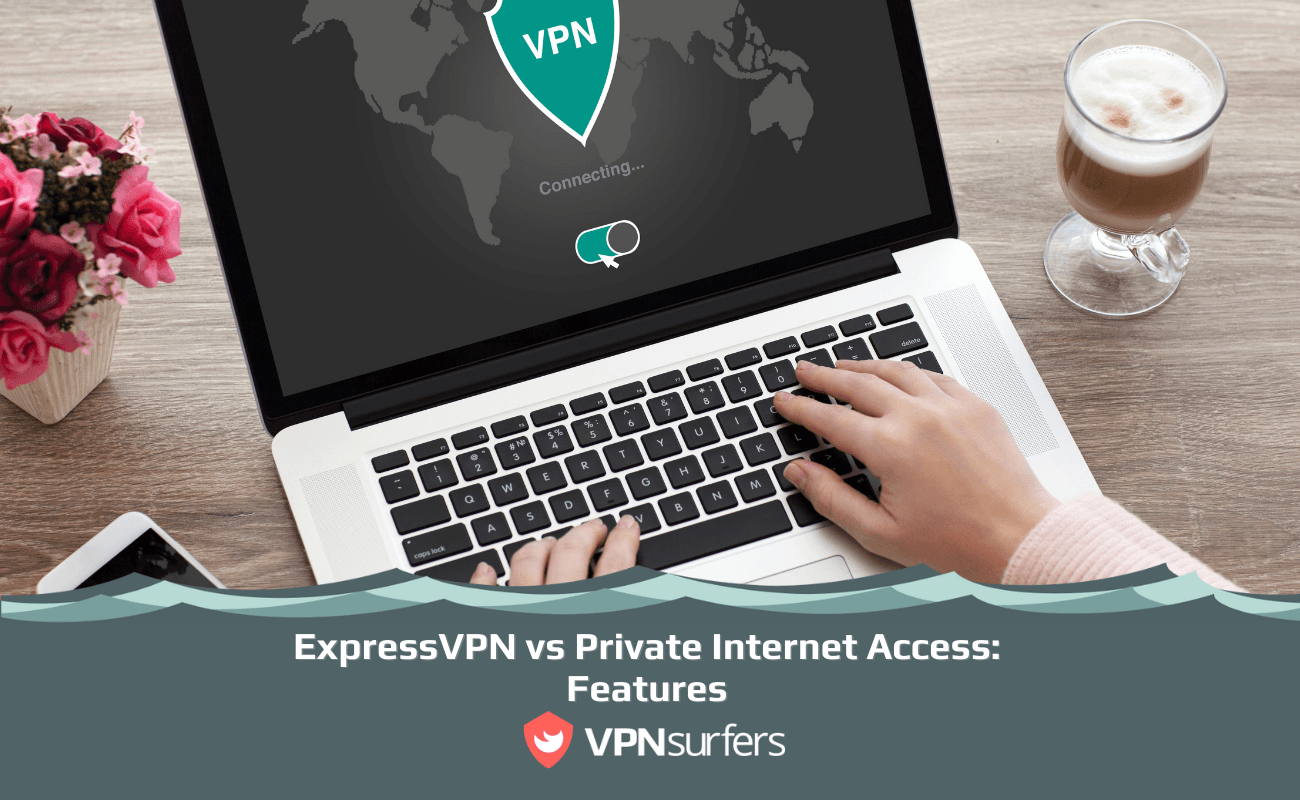
Additional VPN features elevate your internet experience and can be a deciding factor when it comes to choosing a VPN.
ExpressVPN offers many extra features to ensure you have an enjoyable VPN experience. First of all, each ExpressVPN plan comes with 5 simultaneous connections, which is average for VPNs.
For all your content unblocking needs, look no further than Express. ExpressVPN is a fantastic service for streaming and can unblock Netflix libraries and other streaming services in many countries.
To improve your streaming experience, you can employ the ExpressVPN MediaStreamer feature. This Smart DNS feature unblocks streaming websites like Netflix, Hulu, Disney+, Amazon Prime Video, and HBO Max anywhere in the world. However, it doesn’t provide VPN encryption when in use.
Streaming services aren’t the only websites that users can unblock with the VPN. ExpressVPN unblocks social media sites and international gaming store sites to help you find lower prices.
Split tunneling is also available with ExpressVPN and allows you to customize which websites go through the VPN connection and your regular internet network.
Torrenting is also possible with ExpressVPN. While the provider doesn’t heavily advertise its support for torrenting via P2P networking clients, users can do so on any ExpressVPN server. Since there is unlimited bandwidth and no data limits, users can torrent to their hearts’ content.
PIA also offers some great features. Each subscription plan comes with 10 simultaneous connections, which is double the amount offered by ExpressVPN. While PIA can bypass many geo-restrictions on the web, it doesn’t unblock as many streaming services as ExpressVPN. You can watch Netflix in the US, but PIA cannot unblock BBC iPlayer effectively, which is disappointing.
Torrenting, however, is one of PIA’s strong suits. PIA encourages P2P networking on its network and offers a host of tools to improve your torrenting experience. PIA allows port forwarding, which offers faster speeds, perfect for downloading, and permits users to employ the SOCKS5 proxy, which is also optimal for torrenting. Combined with unlimited bandwidth, PIA is one of our top choices for torrenting.
You can also enjoy split tunneling with PIA, which is also great for torrenting. You can tunnel your download activity via the VPN and carry out all your other internet activities via your regular connection.
The winner: Both providers offer similar extra features, but ExpressVPN is the best choice for users who want to stream thanks to its MediaStreamer feature.
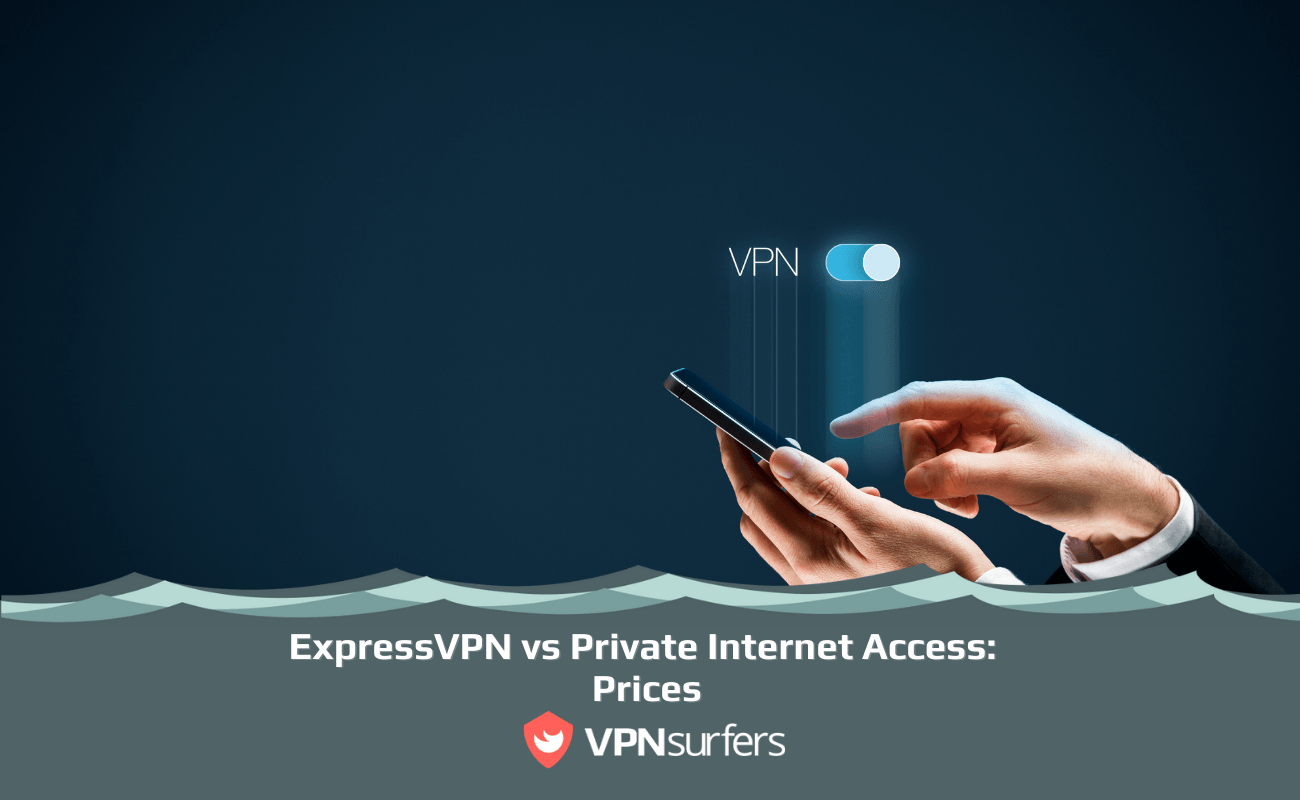 <
<
VPN providers can vastly differ when it comes to pricing plans. Depending on the VPN service itself, privacy features, and extra features, the cost of the subscription plan may cost more than another VPN provider, and the money-back guarantee may be shorter or longer.
ExpressVPN:
Private Internet Access (PIA):
The winner: PIA is, without a doubt, the cheaper VPN service and the pricing winner. The provider has extremely low-cost one and two-year plans, which contrast heavily with ExpressVPN’s rather expensive annual plan. If cost is an important factor for you, choose PIA.
PIA and ExpressVPN both promise their users lightning-fast connection speeds. We carried out some speed tests to check whether these claims are true and see which VPN is faster. It’s worth remembering that many factors can affect speed, including distance from servers, server user load, and encryption settings, including protocols.
ExpressVPN: During our ExpressVPN speed test, we experienced fast download speeds when connected to various servers. We first connected to a US-based server and got a download speed of 36Mbps which is extremely fast. Then, we connected to a server in the UK, and our download speed dropped, but only slightly, to 34Mbps.
Connecting to a Japanese server gave us a download speed of 33Mbps, which is still extremely fast and pretty impressive considering the physical distance from our real-life location. Each internet connection was made using the Lightway protocol, which we feel contributed to the lightning fast speeds.
Private Internet Access: PIA VPN offers users fast connection speeds, although our speed test results showed that they weren’t quite as fast as ExpressVPN. We connected to servers in the same countries and started with a reasonable 34Mbps in the US. Afterward, we connected to a Japan-based served, and our speed dropped to 29Mbps, before connecting to a UK location where we had a download speed of 31Mbps.
Overall, the internet speeds from PIA were fast. We’re sure that using the SOCKS5 proxy would have increased our speeds further, but we refrained from using this during the speed tests.
The winner: Although PIA is a fast VPN, ExpressVPN performs better in terms of speed. However, either VPN service is a good choice when it comes to experiencing breakneck connection speeds.
ExpressVPN and PIA offer a different number of simultaneous connections but operate on similar platforms. Both VPNs have dedicated apps for Windows, macOS, iOS, Android, and Linux. Both providers also have browser extensions for Opera, Chrome, and Firefox. You can configure either VPN to your router or buy a pre-configured router with either VPN already installed on it.
However, ExpressVPN is a better choice if you do want to connect the VPN to your router. ExpressVPN offers a dedicated router app, which PIA does not. This allows users to easily change their IP address without having to go into the router settings.
When it comes to apps, ExpressVPN provides simple but user-friendly VPN apps. We prefer PIA’s dedicated apps since they provide a little more ease of use since they are clearly laid out, allowing you to configure split tunneling and activate features like the kill switch. Moreover, the PIA apps are more stylish in terms of how they look.
The winner: ExpressVPN is the multi-platform support winner and trumps PIA thanks to its router app. Even though its apps are less sophisticated than PIA’s, they are easy to use and well-designed.
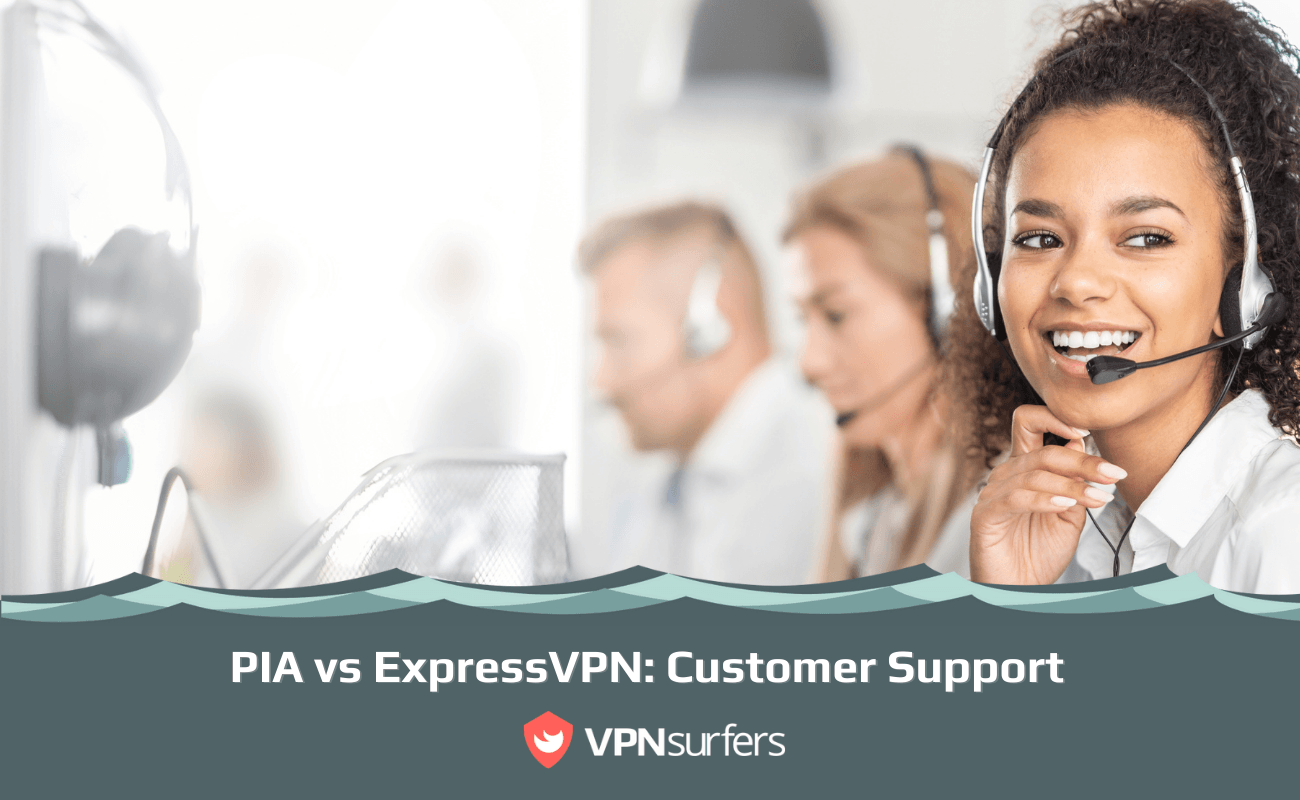
A great VPN service needs to offer customer support. VPN services aren’t devoid of issues, and so customers may need to turn to help from time to time.
ExpressVPN has a range of support options to suit the needs of every user. There is 24/7 live chat support on the website where you can directly speak to a support agent. Alternatively, ExpressVPN features an extensive support section on its site full of tutorials and information, and offers a ticketed email system for users.
PIA is similar to ExpressVPN when it comes to customer support; the VPN offers live chat support on the website, a support center, and email service.
The winner: It’s a tie in terms of the customer support winner since both providers offer live chat support, email contact, and an online help center.
Private Internet Access offers a fantastic VPN solution, complete with fast conection speeds, advanced security and privacy features, a 30-day money-back guarantee, and additional features like split tunneling. It is also cheaper and can bypass geo-blocks.
However, ExpressVPN slightly edges out PIA for a couple of reasons; firstly, the provider has developed its very own protocol for a faster and more secure connection. Secondly, ExpressVPN is a fantastic streaming VPN, able to unblock libraries from across the world. Thirdly, it is based in a privacy-friendly jurisdiction.
With that being said, it is not worth ruling out PIA entirely. The service is great value for money and a better choice than ExpressVPN for torrenters.

I’m Madeleine, and I'm a writer that specializes in cybersecurity, tech products, and all things related to the internet.
I have a keen interest in VPNs and believe that everyone deserves internet freedom and security. I wr...
Read more about the author